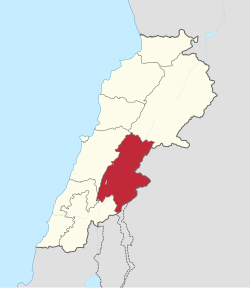Background
The Beqaa Valley is located about 30 km (19 mi) east of Beirut. The valley is situated between Mount Lebanon to the west and the Anti-Lebanon mountains to the east, and broadly corresponds to the Coele-Syria of classical antiquity. [1] It is a fertile valley in eastern Lebanon and its most important farming region. [2]
Due to wars and the unstable economic and political conditions Lebanon faced in the past, with difficulties some farmers still face today, many previous inhabitants of the valley left for coastal cities in Lebanon or emigrated from the country altogether. [3]
Israel stated that the region was a Hezbollah stronghold. The Israeli Air Force targeted several institutions of the Al-Qard Al-Hasan Association, a Hezbollah-linked financial institution on the night of October 20–21, 2024, which included institutions in Beqaa Valley. [4] One day prior to the attacks, Israeli airstrikes targeted the nearby city of Tyre, killing seven and injuring seventeen. [5]
Airstrikes
Throughout 28 October 2024, Israeli Air Force warplanes struck several villages across 16 areas in the valley. The Lebanese Ministry of Public Health reported that at least 60 people were killed by the airstrikes, with at least two being children. In addition, at least 58 more were wounded, with rescue efforts attempting to uncover victims and survivors among the rubble. The Baalbek Civil Defense crew leader Bilal Raad stated described the attacks as akin to a "ring of fire" that "suddenly surrounded the area", and reported that the attacks had targeted several quarters. He further indicated that a lack of rescue equipment significantly hindered rescue operations. [5]
In Al-Allaq, sixteen Lebanese residents all from the same family were killed by one of the Israeli strikes. In Boudai, video footage recorded several residents begging for heavy machinery in order to be able to recover those still trapped in the collapsed buildings. [5]
UNESCO reported that the attacks also targeted the vicinity of the ancient Roman Heliopolis World Heritage site, with preliminary satellite imaging not showing any significant damage. [5]
On 30 October 2024, two villages were struck by Israeli airstrikes, killing nineteen people including eight women. [6]
November
On 2–3 November, over two dozen settlements in Beqaa Valley were targeted by Israeli airstrikes, resulting in the deaths of "dozens" with several more left injured. [7]
On 6 November, the Israeli Air Force carried out 33 air raids, killing 55 people and injuring 59 others. [8]
This page is based on this
Wikipedia article Text is available under the
CC BY-SA 4.0 license; additional terms may apply.
Images, videos and audio are available under their respective licenses.
